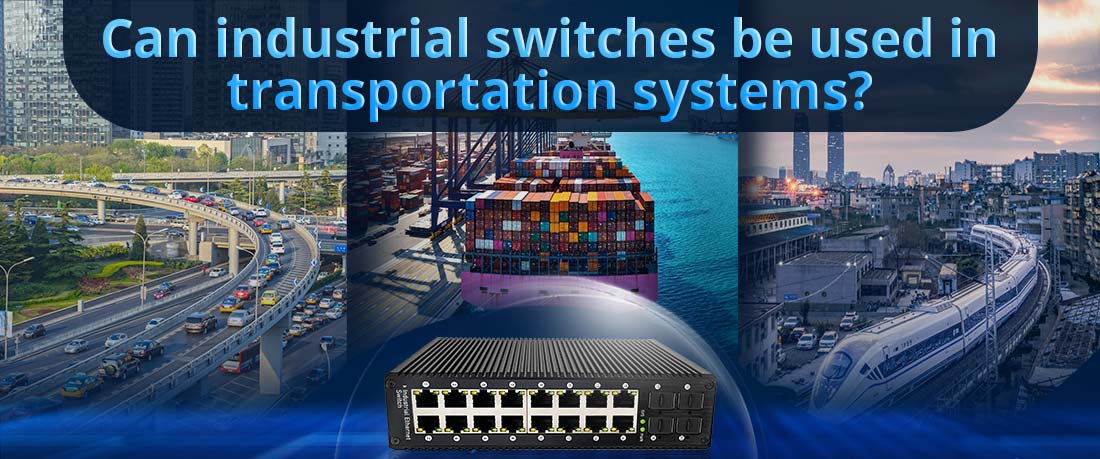
Yes, industrial switches are well-suited for use in transportation systems due to their robustness, reliability, and ability to handle the unique demands of these environments. Here’s a detailed description of how industrial switches are utilized in transportation systems:
1. Durability and Environmental Resistance
a. Rugged Design
--- Temperature Tolerance: Industrial switches are built to operate in extreme temperatures, making them ideal for outdoor transportation applications, such as railways and highways.
--- IP Ratings: Many industrial switches have high ingress protection (IP) ratings, ensuring resistance to dust, moisture, and other environmental hazards common in transportation settings.
b. Shock and Vibration Resistance
--- Built for Harsh Conditions: These switches can withstand significant mechanical shocks and vibrations, crucial for vehicles, trains, and infrastructure that experience constant movement.
2. High Availability and Reliability
a. Redundancy Features
--- Network Redundancy: Industrial switches often support features like Rapid Spanning Tree Protocol (RSTP) and redundancy protocols (e.g., MRP or PRP) to ensure continuous network availability, even during failures.
--- Dual Power Inputs: Many models come with dual power supply options to enhance reliability and reduce the risk of downtime.
b. Long Lifespan
--- Designed for Longevity: Industrial switches are engineered for extended operational life, reducing the frequency and costs associated with replacements in critical transportation infrastructure.
3. Real-Time Data Communication
a. Network Performance
--- Low Latency: Industrial switches provide low-latency data transmission, essential for real-time applications like traffic management systems and automated controls in vehicles.
--- High Throughput: They can handle large amounts of data traffic, supporting multiple video feeds and telemetry from various transportation sensors.
b. Integration with IoT and Smart Systems
--- IoT Connectivity: Industrial switches enable the integration of IoT devices in transportation systems, facilitating data collection and communication from sensors, cameras, and other monitoring devices.
4. Security Features
a. Enhanced Security Protocols
--- Network Security: Industrial switches often include advanced security features such as VLANs, access control lists (ACLs), and port security to protect against unauthorized access and cyber threats.
--- Segmentation of Traffic: They help segment different types of traffic (e.g., operational, administrative) to enhance security and manageability.
5. Support for Various Protocols
a. Compatibility
--- Support for Industry Standards: Industrial switches are compatible with various communication protocols used in transportation, such as Ethernet/IP, Profinet, and Modbus, ensuring seamless integration with existing systems.
--- Interoperability: Their ability to work with legacy and modern systems makes them versatile for diverse transportation applications.
6. Applications in Transportation Systems
a. Railway Systems
--- Signaling and Control: Industrial switches are used in railway signaling systems to ensure reliable communication between trains and control centers.
--- Surveillance: They support video surveillance systems for monitoring train stations and railway tracks.
b. Road Traffic Management
--- Traffic Control Systems: These switches connect traffic signals, cameras, and sensors to optimize traffic flow and enhance safety.
--- Smart City Applications: Industrial switches are integral to smart city initiatives, facilitating communication between various transportation infrastructure components.
c. Public Transport
--- Bus and Tram Systems: Used in real-time tracking systems, passenger information systems, and for communication between vehicles and control centers.
--- Fleet Management: They support telematics solutions for monitoring vehicle performance and logistics.
7. Scalability and Future-Proofing
a. Easily Expandable
--- Modular Designs: Many industrial switches offer modular options, allowing for easy expansion as transportation networks grow and technology evolves.
--- Integration with New Technologies: They can support emerging technologies such as autonomous vehicles and advanced traffic management systems.
Conclusion
Industrial switches play a crucial role in transportation systems, providing the reliability, performance, and features necessary to meet the demands of various applications. Their rugged design, high availability, real-time communication capabilities, security features, and compatibility with different protocols make them essential components in modern transportation infrastructure, contributing to enhanced safety, efficiency, and operational effectiveness.